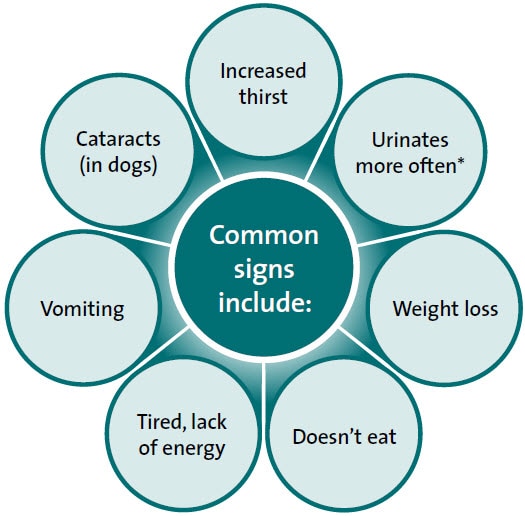
-
Find the right food for your pet
Take this quiz to see which food may be the best for your furry friend.
Find the right food for your pet
Take this quiz to see which food may be the best for your furry friend.
Featured products
 Adult Healthy Cuisine Roasted Chicken, Carrots & Spinach Stew Dog Food
Adult Healthy Cuisine Roasted Chicken, Carrots & Spinach Stew Dog FoodDelicious roasted chicken paired with tender vegetables in a succulent stew
Shop Now Adult 7+ Perfect Digestion Chicken, Whole Oats & Brown Rice Recipe Dog Food
Adult 7+ Perfect Digestion Chicken, Whole Oats & Brown Rice Recipe Dog FoodScience Diet's breakthrough nutrition supports ultimate digestive well-being & healthy microbiome for dogs age 7+
Shop Now Small & Mini Savory Stew with Chicken & Vegetables Dog Food
Small & Mini Savory Stew with Chicken & Vegetables Dog FoodA delicious complement to the nutrition of Science Diet Small & Mini 7+ dog food
Shop NowFeatured products
 Adult 7+ Senior Vitality Chicken & Vegetable Stew Cat Food
Adult 7+ Senior Vitality Chicken & Vegetable Stew Cat FoodImproves Everyday Ability to Get Up & Go
Shop Now Adult Savory Entrée Can Variety Pack Cat Food
Adult Savory Entrée Can Variety Pack Cat FoodPrecisely balanced nutrition with the delicious taste of savory minced chicken to help fuel the energy needs of cats during the prime of their life
Shop Now Adult 7+ Tender Tuna Dinner Cat Food
Adult 7+ Tender Tuna Dinner Cat FoodWith delicious chunks in a decadent gravy
Shop Now -
Dog
- Dog Tips & Articles
-
Health Category
- Weight
- Food & Environmental Sensitivities
- Urinary
- Digestive
- Joint
- Kidney
-
Life Stage
- Puppy Nutrition
- Adult Nutrition
- Senior Nutrition
Cat
- Cat Tips & Articles
-
Health Category
- Weight
- Skin & Food Sensitivities
- Urinary
- Digestive
- Kidney
-
Life Stage
- Kitten Nutrition
- Adult Nutrition
Featured articles
 Does My Pet Hate Me?
Does My Pet Hate Me?Learn tips for bonding with your pet if you've ever thought, 'My dog doesn't like me, or 'Why do I have a standoffish cat?'
Read More Do Dogs and Cats have Belly Buttons?
Do Dogs and Cats have Belly Buttons?Learn whether cats & dogs have belly buttons like humans, what the function is, and if there are any health concerns associated with it.
Read More Why Are Dogs and Cats So Cute?
Why Are Dogs and Cats So Cute?If waggy puppy dog tails and furry kitten yawns make you swoon, you're not alone. Why are cats so cute? And, dogs too! Let's find out!
Read More -


What is diabetes?
Diabetes mellitus is a condition that develops when your dog cannot use sugar (glucose) effectively and control the sugar level in the blood. Insulin, which is made in the pancreas, is essential for regulating the use and storage of blood glucose. Insufficient insulin production is potentially life threatening.
Just like in humans, diabetes in dogs is serious, but manageable. There are two types of diabetes, and although there is no cure, dogs with either type can be successfully managed through nutrition, exercise, and if necessary, regular insulin medication. With the right food and advice from your veterinarian, your diabetic dog can still enjoy a happy, active life.
What causes diabetes?
A reduction in insulin production is usually caused by damage to the pancreas. The pancreas is responsible for producing the proper amount of insulin to control sugar levels. In some dogs hormonal changes or medications can reduce the effect of insulin. If your dog's pancreas is damaged, long-term and potentially life-threatening symptoms could occur and must be managed.
Factors that increase the chance of your dog developing diabetes include:
Body condition: Overweight or obese dogs are more likely to develop diabetes.
Age: Dogs can develop diabetes at any age, but the peak onset is around 8 years.
Gender: Females are twice as likely to develop diabetes.
Breed: Some breeds of dogs, such as Samoyeds, miniature schnauzers, miniature poodles and bichon frise are more predisposed to diabetes than others.
Other factors could include poor nutrition, hormonal abnormalities and stress.
Does my dog have diabetes?
The signs of diabetes are difficult to recognize because they are similar to those of other disorders like kidney disease. Your veterinarian may also need to perform tests to ensure an accurate diagnosis. If your dog appears weak or thirsty, frequently urinates, experiences rapid weight loss, is depressed, or has abdominal pain, he could be diabetic. If you notice these signs, please contact your veterinarian.
Signs and symptoms of diabetes:
- Increased thirst
- Weight loss
- Not eating
- Tired, lack of energy
- Vomiting
- Cataracts

* cats


Tasty Tips
IMPORTANT: Once diabetes is diagnosed, it is important that your dog is regularly monitored. Your veterinarian will check your dog’s glucose levels and will adjust medication to keep your dog stable.
Treatment and the importance of nutrition
Establish a routine: The key to keeping a diabetic dog healthy is routine. Feeding, exercise and giving medication should take place at the same time each day. This helps maintain stable blood glucose levels. Your veterinarian and health care team can give you advice on the best routine for your pet.
While there is no cure for diabetes mellitus, veterinarians recognize it can be controlled with insulin, exercise and proper nutrition. The food your dog eats plays an important role in overall health and well-being.. When your dog has diabetes, it’s even more important to feed an appropriate dog food consistently.Therapeutic dog foods containing increased levels of fiber can help manage their blood sugar levels while also promoting a healthy body weight. For accurate diagnosis and treatment options, always consult your veterinarian and ask them to recommend the best food for your dog’s diabetes.
Questions to Ask Your Veterinarian about Diabetes
- What are the treatment options for my dog’s diabetic health?
- Ask how nutrition works with other available options
- Should nutrition be a part of my dog’s treatment regimen? Would you recommend veterinary food for my dog’s diabetic health?
- What if I have multiple dogs? Can I feed them all the same dog food?
- How can nutrition help? What are the benefits of feeding therapeutic food as part of my dog's management plan?
- How long will I need to feed the recommended food to my dog?
- How long will I need to feed the recommended dog food to my dog?
- Ask how feeding a therapeutic dog food can help promote diabetic health for my dog
- What is the best way (email/phone) to reach you or your hospital if I have questions?
- Ask if you need a follow-up appointment.
- Ask if a reminder email or notice will be sent.


One of our staff authors prepared this article for you
Related products

Science Diet's breakthrough nutrition supports ultimate digestive well-being & healthy microbiome for dogs age 7+

Delicious braised beef paired with tender vegetables in a succulent stew

A delicious complement to the nutrition of Science Diet Small & Mini 7+ dog food

Delicious roasted chicken paired with tender vegetables in a succulent stew
Related articles

Learn about choosing the right food for your mature or older dog, ensuring he receives the correct balance of nutrition.

Your dog's coat and skin are a big part of your dog's overall health. Ensure you keep your dog's coat healthy, by following these simple tips.

Large and giant breed puppies have different nutritional needs than other dogs. Learn how to provide the special care they need to grow up big and strong.

Hill's Science Diet Small & Toy Breed dog foods are designed to meet the nutritional needs for your small dog at every life stage. Learn more here.

Put your dog on a diet without them knowing
Our low calorie formula helps you control your dog's weight. It's packed with high-quality protein for building lean muscles, and made with purposeful ingredients for a flavorful, nutritious meal. Clinically proven antioxidants, Vitamin C+E, help promote a healthy immune system.
Put your dog on a diet without them knowing
Our low calorie formula helps you control your dog's weight. It's packed with high-quality protein for building lean muscles, and made with purposeful ingredients for a flavorful, nutritious meal. Clinically proven antioxidants, Vitamin C+E, help promote a healthy immune system.

